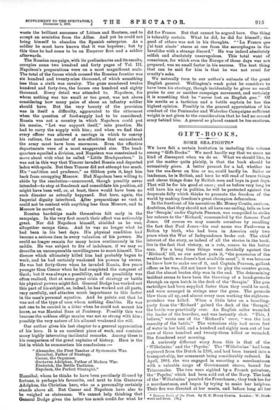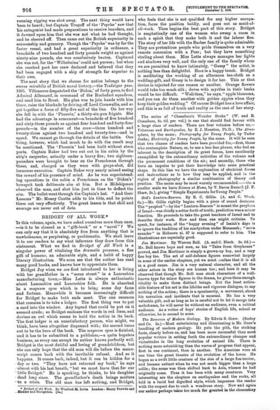GIFT-BOOKS.
SOME SEA-FIGHTS.*
WE have felt a certain hesitation in including this volume among "Gift-Books." We need hardly say that we mean no kind of disrespect when we do so. What we should like, to put the matter quite plainly, is that the book should be extensively given. A better present for a lad, whether he has the sea-fever on him or no, could hardly be. Sailor or landsman, he is British, and here he will read of brave things and clever things done by British men and boys in past days. That will be for his good at once ; and as before very long he will have his say in politics, he will be protected against the desperate folly which thinks to promote the freedom of the world by making freedom's great champion defenceless.
In the forefront of his narratives Mr. Money Coutte, anxious, doubtless, that they should not all have one ending, tells us how the ‘Serapis,' under Captain Pearson, was compelled to strike her colours to the 'Richard,' commanded by the famous Paul Jones. Of course we may console ourselves by recalling the fact that Paul Jones—his real name was Paul—was a Briton by birth, who had been in America only two years when the War of Independence broke out. The chief interest of the story, as indeed of all the stories in the book, lies in the fact that victory, as a rule, comes to the better man. For a long time things went decidedly against the 'Richard,' till, as our author puts it, "the possession of the weather berth was Jones's last available asset"; it was because he knew how to make use of it, and Captain Pearson, gallant officer as he was, did not know how to play the counter game, that the almost beaten ship won in the end. The determining incident seems to have been the throwing of a hand-grenade through an open hatch in the deck of the Serapis: The gun cartridges had been supplied faster than they could be used, and were arranged in strings near the guns. The grenade blew them all up, and almost every man working the eighteen- pounders was killed. When a little later on a boarding- party from the 'Richard' gained the deck of the Serapis,' the battle was practically over. An English sailor wounded the leader of the boarders, and was instantly shot. "This, I believe," wrote one of the ' Richard's ' crew, "was the last casualty of the battle." The victorious ship had seven feet of water in her hold, and a hundred and eighty men out of her crew of three hundred and twenty-three killed or wounded. She foundered next morning.
A curiously different story from this is that of the
Wilhelmina,' and the 'Psyche.' The Wilhelmina ' had been captured from the Dutch in 1798, and had been turned into a transport-ship, her armament being considerably reduced. In April, 1804, she was engaged in escorting a merchantman with a valuable cargo of Government stores, bound for Trincomalee. The two were sighted by a French privateer, the Psyche,' which had been sold out of the Navy. The look of the Wilhelmina ' puzzled the Frenchmen; they took her for a merchantman, and began by trying to make her helpless. Their fire was directed at her masts, and before long all her • Famous Duo!, of Use Fifa. By H. B. Money Coutta. London : W. Mack. wood and Sons. [Se.]
running rigging was shot away. The next thing would have 'been to board ; but Captain Trogoff of the 'Psyche' saw that his antagonist had made preparations to receive boarders, and it dawned upon him that she was not what he bad thought, and he sheered off. Then came out the British superiority in -seamanship and gunnery. Though the 'Psyche' was by far the Taster vessel, and had a great superiority in ordnance, a broadside of two hundred and forty pounds weight as against ninety-nine pounds, she was conclusively beaten. Captured -she was not, for the Williehnina' could not pursue; but when she reached port her crew declared and believed that they 'had been engaged with a ship of strength far superior to their own.
The next story that we choose for notice belongs to the -onnus mirabilis of British naval history,—the Trafalgar year, 1805. Villeneuve despatched the Didon,' of forty guns, to find Admiral Allemand, in command of the Rochefort squadron, and send him to Brest. His plan was to join hands with him there, raise the blockade by driving off Lord Cornwallis, and so get together a force of fifty-five sail of the line. On her way she fell in with the 'Phoenix,' a thirty-six-gun frigate. She bad the advantage in armament—a broadside of five hundred and sixty-three pounds as against four hundred and forty-four pounds—in the number of the crew—three hundred and twenty-three against two hundred and twenty-two—and in speed. We cannot go through the details of the battle. One thing, however, which had much to do with the result may 'be mentioned. The 'Phoenix' had been built without stern ports. Captain Baker had two cut out in his cabin by the -ship's carpenter, actually under a heavy fire ; two eighteen- pounders were brought to bear on the Frenchman through these, and, charged as they were with grape-shot, did immense execution. Captain Baker very nearly missed seeing the reward of his presence of mind. As he was superintend- ing operations in the cabin a Frenchman on the `Didon's ' bowsprit took deliberate aim at him. But a Midshipman 'observed the man, and shot him just in time to deflect the aim. The bullet went through the Captain's hat. "And their Lessons" Mr. Money Coutts adds to his title, and he points them out very effectively. The great lesson is that skill and courage are never out of date.







































































 Previous page
Previous page